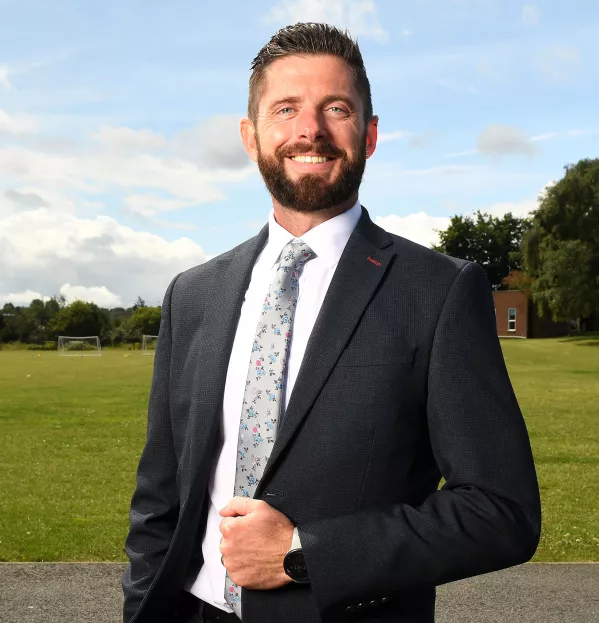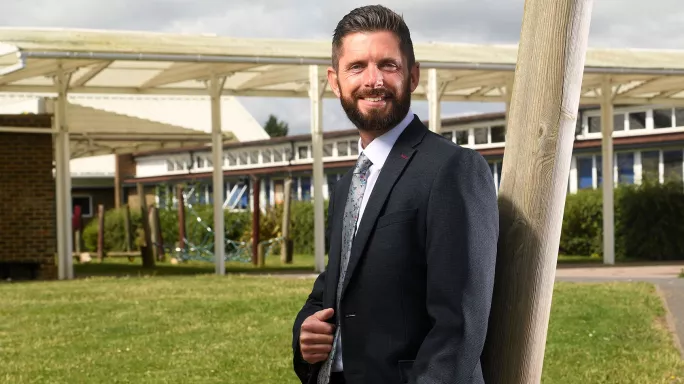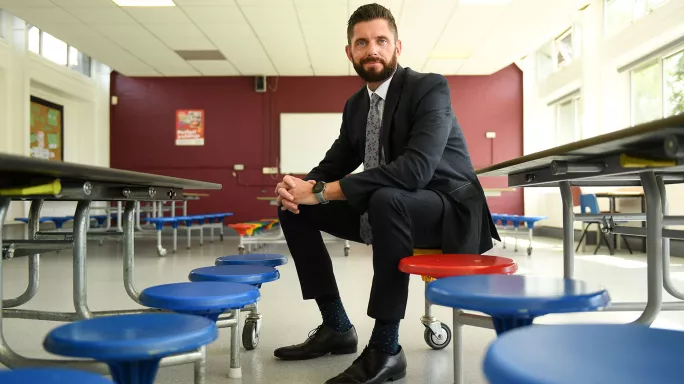- Home
- Leadership
- Strategy
- 10 questions...with Paul Glover
10 questions...with Paul Glover

Paul Glover is the chief executive of STEP, a multi-academy trust (MAT) made up of 20 primary schools across South London and East Sussex.
Glover, who first started his career as a primary teacher in Birmingham, was appointed to the role in 2022.
Here, he answers Tes’ 10 questions, discussing his most memorable school trips, the alternative career he almost had, and the need for better provision for students with special educational needs and disabilities (SEND).
1. Who was your most memorable teacher and why?
I went to primary and secondary school in the West Midlands, and there wasn’t a teacher who stood out to me massively.
I have a lot of memories from school, but mostly to do with the subjects that excited and interested me. That would definitely be English and then, quite weirdly, religious philosophy, which is what I ended up doing as part of my teaching degree.
I genuinely don’t know why no one teacher stands out. I was fortunate. I had a great set of friends and thoroughly enjoyed my time at school. I even went back to my primary school for my first work experience placement.
2. What were the best and worst things about your time at school?
The best thing was socialising with friends. Some of my best friends today are people I went to secondary school with.
We had some amazing experiences on school residentials. In my early teens, we went to Wales around Snowdon. Later, I went to Andorra with the PE department, where we did lots of sports activities. I had been abroad before then, but those school trips shaped my love of travel.
I don’t remember any explicitly bad things, other than the usual - the volume of homework, and having a bag that was far too heavy to carry. I’d get the bus to school and then have to carry around 10 books a day, plus my sports kit. It was horrible!
3. Why do you work in education?
I didn’t intend to. For years I wanted to go into the police. But after various conversations and medical checks, it didn’t work out.
So I applied for teaching, and ended up doing a BA in primary studies in South Wales. As soon as I started my first placement, I thought: this is it. The next placement went even better. And it rolled on from there.
Now, I work in education because of the difference we can make, and I’ve been fortunate enough to see that in so many different settings.

My first teaching job was in Birmingham in a school that was in “special measures” when I started. It was situated in a really challenging part of the city.
I was a Year Five teacher and my class did exceptionally well. The children’s behaviour improved significantly, as did their outcomes. I got a real sense of satisfaction from it.
That was a massive driver in terms of what I did next. It made me want to work in challenging communities so I could really make a difference.
4. What are you proudest of in your career and what do you regret?
I’m proudest of the impact that STEP Academy Trust has had on thousands of children.
In 2011, I became headteacher of Applegarth Junior School, which was then in “special measures”. In 2012, it became “good”. Around then, someone I really respected asked me where Applegarth would be in ten years’ time because they said having an improvement model that works over time is the measure of an outstanding leader.
Applegarth remains a “good” school. That shows me that our school improvement model is sustained - it’s real.
I hesitate to use the word “regrets” - it’s too strong. But thinking of mistakes, I would say moving too quickly. We have always made decisions with the children’s best interests at heart, but sometimes pausing for 12 or 24 hours before making a decision would have helped us long term.
5. What is the best aspect of our school system today?
I think one of the best aspects of the current system is the huge amount of positive work that multi-academy trusts do.
I don’t think that every school should be a MAT, or that every trust is great, but I think that the freedoms of the academies programme allow MATs that are run well to run really well.
More Tes’ 10 questions:
- Matthew Shanks, CEO of Education South West
- Carol Dewhurst, CEO of Bradford Diocesan Academies Trust
- Lee Mason-Ellis, CEO of the Pioneer Academy
6. What about the worst?
One of the worst things is the lack of appropriate provision for students with special educational needs and disabilities (SEND). And it’s a problem that should have been identified much earlier. If we’d had this conversation six years ago, we’d likely be saying the same thing then.
In particular, there are inconsistencies in terms of diagnosing and assessing, so we know that significant amounts of funding are not being used effectively.
I think the other main problem is around low pupil numbers and how that is linked to funding. We are funded based on the numbers from the previous school census, not the number we’ve got in our schools right now, which can be challenging.
I also think there is a huge discrepancy between funding amounts for inner London, outer London and the rest of England, which need to be looked at.
7. Who in education has influenced you the most?
Without a shadow of a doubt, the founder of STEP Academy Trust, Mark Ducker.
He refreshed and energised my own view on education. Before he retired a few years ago, I worked with him as his deputy. His level of integrity is second to none.

The other person who has been a massive support is Sir David Carter. His book Leading Academy Trusts: Why Some Fail, But Most Don’t is brilliant because it’s so straightforward.
8. If you became education secretary tomorrow, what would be the first thing you would do?
I would devise a strategy to address those biggest challenges - SEND and funding linked to pupil numbers.
As with anything, it’s easy to make a lot of promises to staff and to your communities. What’s most important is following those promises through, and executing a strategic plan.
9. What will our schools be like in 30 years?
I can only really speak for primary schools.
Certainly, classroom delivery is going to be different. There is no doubt that the role of AI is going to feature more strongly. That said, I would like to think that the fundamentals of education won’t change, because I think it will still be the case that children - and certainly younger children - need a qualified teacher in front of them.
Since the pandemic, we’ve had all these conversations about remote schooling. But I really don’t think you could deliver an early years’ curriculum virtually.
10. What are the most important lessons you’ve learned from doing this job?
Always make every decision with the children’s best interests at heart.
Having resilience and courage helps, too.
You need a Tes subscription to read this article
Subscribe now to read this article and get other subscriber-only content:
- Unlimited access to all Tes magazine content
- Exclusive subscriber-only stories
- Award-winning email newsletters
Already a subscriber? Log in
You need a subscription to read this article
Subscribe now to read this article and get other subscriber-only content, including:
- Unlimited access to all Tes magazine content
- Exclusive subscriber-only stories
- Award-winning email newsletters



